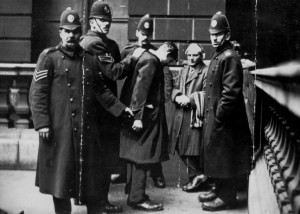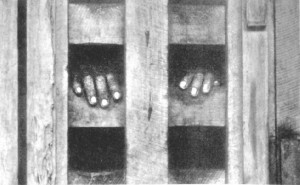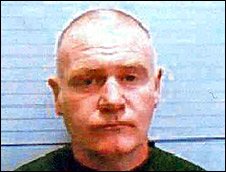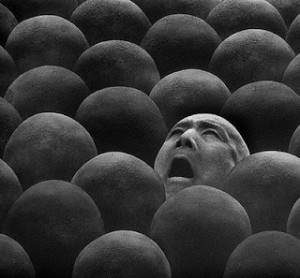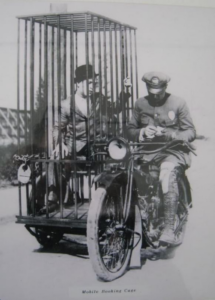Tag Archives: Bowden John
Prison As Political Battleground
Either as a political issue or personal experience prison repression isn’t something the radical left in Britain is particularly familiar with or much inclined to mobilise against. Prison remains largely a working class experience targeted against the poorest and most marginalised of that class. However in a society increasingly polarised and divided between rich and poor in a political climate of growing repression and authoritarianism prisons are being refashioned more and more into instruments of political as well as social control. This will eventually find reflection in the nature and composition of the prisoner population as political activists increasingly supplement the imprisoned poor.
Continue reading Prison As Political Battleground
Parole Board Stitch-up

John Bowden writes about his treatment at the hands of a megalomaniac social worker and an all too acquiescent Parole Board. Further articles by John, and others about his current situation and what you can do to help, can be found on this site.
In June of 2011, the Parole Board for England and Wales finally carried out its statutory obligation to review my continued imprisonment after 32 years of captivity. Its official terms of reference were clear and straightforward; to be reassured that I represented no risk or danger to the public, (the main legal criteria determining whether a life sentence prisoner is safe to be released or not), and that I could be safely managed or supervised in the community beyond prison.
Continue reading Parole Board Stitch-up
John Bowden Update
We’ve not heard from John since his recent court appearance on the September 22, but members of Glasgow FRFI were outside the court with placards to support him. They’ve said his next court appearance is on the October 27 and his trial date has been set for November 17. This trial relates to a ridiculous “assault” charge on a prison officer at Greenock jail, which was clearly a set up to prevent him from being progressed onto the semi-open part of the prison.
John had been transferred across the Scottish border back to England and has been transferred frequently around the prison system since – eight moves in the last two months.
Continue reading John Bowden Update
‘Prison As Political Battleground’ by John Bowden, radical long-term prisoner (UK)
Either as a political issue or personal experience prison repression isn’t something the radical left in Britain is particularly familiar with or much inclined to mobilise against. Prison remains largely a working class experience targeted against the poorest and most marginalised of that class. However in a society increasingly polarised and divided between rich and poor in a political climate of growing repression and authoritarianism prisons are being refashioned more and more into instruments of political as well as social control. This will eventually find reflection in the nature and composition of the prisoner population as political activists increasingly supplement the imprisoned poor.
Continue reading ‘Prison As Political Battleground’ by John Bowden, radical long-term prisoner (UK)
John Bowden Writes From HMP Shotts(2012)
John Bowden writes about his treatment at the hands of a megalomaniac social worker and an all too acquiescent Parole Board. Further articles by John, and others about his current situation and what you can do to help, can be found here and on the Leeds ABC website.
Continue reading John Bowden Writes From HMP Shotts(2012)
WHY PRISONERS FIGHT BACK
June 1990.
The Strangeways uprising, distinguishable for its intensity and duration, has generated a plethora of interpretations and analysed about what are perceived as the current ills of the British prison system and placed prisons as an issue close to the top of the political agenda. Unfortunately, none of the discussions about the cause and the rationale of the uprising, which acted as a catalyst for generalised unrest throughout the entire prison system, went much beyond the usual superficial and non-contentious issues of overcrowding, staff shortages and, of course, the existence of a ubiquitous minority of ‘subversive’ prisoners hel-lbent on disrupting prison life for purely gratuitous reasons.
HISTORIES OF RESISTNCE
John Bowden was imprisoned for murder in 1980 with a life sentence. He was now served 34 years, in prison across England and Scootland. In that time he escaped for 18 months in 1992 and again in 2008 for a few months before recapture; he has held an assistant governor hostage for two days; and received countless beatings, solitary confinements and many other tactics of HMPs to quell dissent and resistance. Throughout, he has maintained fierce resistance, never backing down and for this- despite parole boards admission that he should now be in open jail, if not released – the Prison Service still keep him inside.
In recent months it has now become fully that he is being held due to his opposition to the prison system. They admit that he poses no threat to the public, yet his continuing work highlighting the denial of prisoners rights and the inhability of the prison system to live up to even its own rules, means they will not release him. Still he does not back down and capitulate to their wishes.
‘The Subcontraction Of Prison Violence’ by John Bowden
Ultimately prisons exist as instruments of state violence, and no matter how legitimized by statuary law their prime function and purpose is to inflict pain and suffering in the interests of social control. They are nothing more than blunt weapons of state power and ruling class authority and for those confined within them the experience of naked vulnerability and brutality is a constant every day reality.
Continue reading ‘The Subcontraction Of Prison Violence’ by John Bowden
Parole Board Stitch-up (2011)
John Bowden writes about his treatment at the hands of a megalomaniac social worker and an all too acquiescent Parole Board. Further articles by John, and others about his current situation and what you can do to help, can be found on this site.
Continue reading Parole Board Stitch-up (2011)
